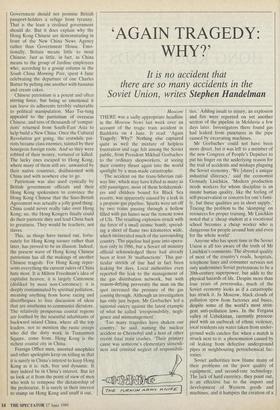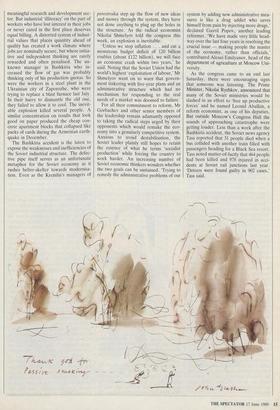`AGAIN TRAGEDY: WHY?'
It is no accident that there are so many accidents in the
Soviet Union, writes Stephen Handelman Moscow THERE was a sadly appropriate headline in the Moscow News last week over an account of the tragic train accident in Bashkiria on 4 June. It read: 'Again Tragedy: Why?' Nothing else captured quite as well the mixture of helpless frustration and rage felt among the Soviet public, from President Mikhail Gorbachev to the ordinary shopworkers, at seeing their country thrust again into the world spotlight by a man-made catastrophe.
The accident on the trans-Siberian rail- way line, which may have killed as many as 650 passengers, most of them holidaymak- ers and children bound for Black Sea resorts, was apparently caused by a leak in a propane-gas pipeline. Sparks were set off by two trains passing through a hollow filled with gas fumes near the remote town of Ufa. The resulting explosion struck with the force of a small atomic bomb, spread- ing a sheet of flame two kilometres wide, which incinerated much of the surrounding country. The pipeline had gone into opera- tion only in 1986, but a Soviet oil ministry official acknowledged there had already been at least 30 'malfunctions'. This par- ticular stretch of line had in fact been leaking for days. Local authorities even reported the leak to the management of the gas distribution network, but with reason-defying perversity the man on the spot increased the pressure of the gas coming through. Although an investigation has only just begun, Mr Gorbachev led a national outcry against the latest example of what he called 'irresponsibility, negli- gence and mismanagement'.
`Too many tragedies have shaken our country,' he said, naming the nuclear accident in Chernobyl and a host of other recent fatal train crashes. 'Their primary cause was someone's elementary slovenli- ness and criminal neglect of responsibili- ties.' Adding insult to injury, an explosion and fire were reported on yet another section of the pipeline in Moldavia a few days later. Investigators there found gas had leaked from punctures in the pipe caused by excavating machines.
Mr Gorbachev could not have been more direct, but it was left to a member of the new Congress of People's Deputies to put his finger on the underlying reason for the trail of accidents and mishaps plaguing the Soviet economy. 'We [share] a unique industrial illiteracy,' said the economist Gennady Lisichkin. 'Modern production needs workers for whom discipline is an innate human quality, like the feeling of self-preservation or concern for one's fami- ly, but these qualities are in short supply.' Tracing the problem to the 'skimping' on resources for proper training, Mr Lisichkin noted that a 'cheap student at a vocational school becomes a cheap worker who is dangerous for people around him and even for the whole world'.
Anyone who has spent time in the Soviet Union is all too aware of the truth of Mr Lisichkin's comments. The abysmal quality of most of the country's roads, hospitals, telephone lines and consumer services not only undermines Soviet pretensions to be a 20th-century superpower, but adds to the physical hazards of life. Despite more than four years of perestroika, much of the Soviet economy looks as if a catastrophe has struck it. In Moscow, black clouds of pollution spew from factories and buses, despite some of the world's most strin- gent anti-pollution laws. In the Fergana valley of Uzbekistan, currently preoccu- pied with an outbreak of ethnic violence, local residents say water taken from under- ground wells catches fire when a match is struck next to it: a phenomenon caused by oil leaking from defective underground pipes at neighbouring petrochemical fac- tories.
Soviet authorities now blame many of their problems on the poor quality of equipment, and second-rate technology. The lack of hard currency, they point out, is an effective bar to the import and development of Western goods and machines, and it hampers the creation of a meaningful research and development sec- tor. But industrial 'illiteracy' on the part of workers who have lost interest in their jobs or never cared in the first place deserves equal billing. A distorted system of indust- rial values that places quantity ahead of quality has created a work climate where jobs are nominally secure, but where initia- tive and independent thinking are rarely rewarded and often penalised. The un- known manager in Bashkiria who in- creased the flow of gas was probably thinking only of his production quotas. So were the workers in a steel plant in the Ukrainian city of Zaporozhe, who were trying to replace a blast furnace last July. In their hurry to dismantle the old one, they failed to allow it to cool. The inevit- able explosion killed several people. A similar concentration on results that look good on paper produced the cheap con- crete apartment blocks that collapsed like packs of cards during the Armenian earth- quake in December. The. Bashkiria accident is the latest to expose the weaknesses and inefficiencies of the Soviet industrial structure. The defec- tive pipe itself serves as an unfortunate metaphor for the Soviet economy as it rushes helter-skelter towards modernisa- tion. Even as the Kremlin's managers of perestroika step up the flow of new ideas and money through the system, they have not done anything to plug up the holes in the structure. As the radical economist Nikolai Shmelyov told the congress this week, an explosion is inevitable.
`Unless we stop inflation . . . and cut a monstrous budget deficit of 120 billion roubles (about £122 billion), we will face an economic crash within two years,' he said. Noting that the Soviet Union had the world's highest 'exploitation of labour,' Mr Shmelyov went on to warn that govern- ment tinkering with five-year plans and an administrative structure which had no mechanism for responding to the real needs of a market was doomed to failure.
For all their commitment to reform, Mr Gorbachev and other senior members of the leadership remain adamantly opposed to taking the radical steps urged by their opponents which would remake the eco- nomy into a genuinely competitive system. Anxious to avoid destabilisation, the Soviet leader plainly still hopes to retain the essence of what he terms 'socialist production' while forcing the country to work harder. An increasing number of Soviet economic thinkers wonders whether the two goals can be sustained. `Trying to remedy the administrative problems of our system by adding new administrative mea- sures is like a drug addict who saves himself from pain by injecting more drugs,' declared Gavril Popov, another leading reformer. 'We have made very little head- way over the last four years in resolving the crucial issue — making people the master of the economy, rather than officials,' contributed Alexei Emilyanov, head of the department of agriculture at Moscow Uni- versity.
As the congress came to an end last Saturday, there were encouraging signs that someone was listening. The Prime Minister, Nikolai Ryzhkov, announced that many of the Soviet ministries would be slashed in an effort to 'free up productive forces' and he named Leonid Abalkin, a reform economist, as one of his deputies. But outside Moscow's Congress Hall the sounds of approaching catastrophe were getting louder. Less than a week after the Bashkiria accident, the Soviet news agency Tass reported that 31 people died when a bus collided with another train filled with passengers heading for a Black Sea resort. Tass noted matter-of-factly that 464 people had been killed and 978 injured in acci- dents at Soviet rail junctions last year. `Drivers were found guilty in 902 cases,' Tass said.



















































 Previous page
Previous page